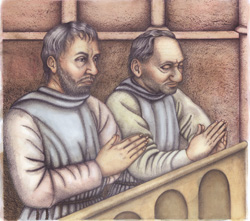 |
 |
 |
 |
 |
 |
 |
|
Spiritual obligations (9/14)
The lay-brothers generally rose later than the monks and entered their choir in the church while the monks were singing Vigils. Although they were out of eyeshot it was important that they were quiet and that their arrival caused as little disruption as possible. For this reason the lay-brothers were sometimes permitted to wear second-hand boots at Vigils, which presumably made less noise than their clunky work-shoes.(14) Hoods were not worn at Vigils and, like the monks, the lay-brothers stood for this Office. A number of anecdotes were recounted to deter lay-brothers from nodding off during Vigils or indeed at any of the other Hours. A German Cistercian, Caesarius of Heisterbach, tells of a serpent that was seen creeping across the back of one lay-brother who was accustomed to fall asleep during the Offices, and which he identifies as the devil, feeding off the lay-brother’s drowsiness.(15) Whenever the lay-brothers celebrated the Hours in the church they did so in silence, which meant that they did not interfere with the monks’ chanting. They also co-ordinated their bows in accordance with the monks’, thus giving an appearance of visual harmony. Offices that were celebrated at the workplace were recited aloud and led by the seniormost amongst those gathered; if a lay-brother celebrated an Office on his own, however, he did so in silence. Whereas the monks heard Mass daily and received Communion weekly, the lay-brothers generally only attended Mass on Sundays and feast days, and received Communion about seven times a year. The lay-brothers who resided at the granges also attended the abbey on these occasions. On the vigils of these days the master of conversi, the monk entrusted with their spiritual care, visited the granges to hear the lay-brothers’ confessions. The lay-brothers were also expected to attend burial masses and might assist at private masses, celebrated by monk priests in side altars or chapels; on these occasions the lay-brothers provided the water for the lavabo and lit the candle at the consecration. |
